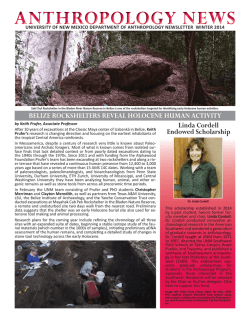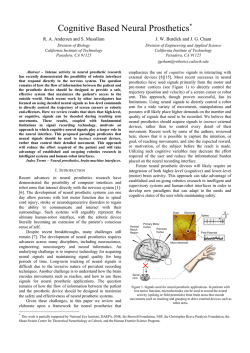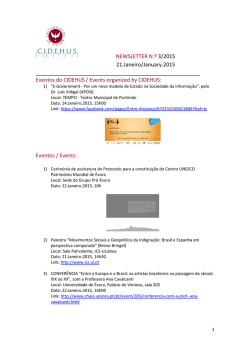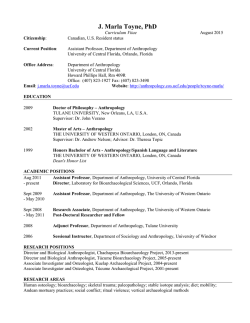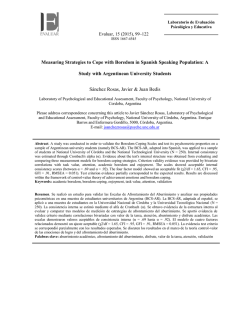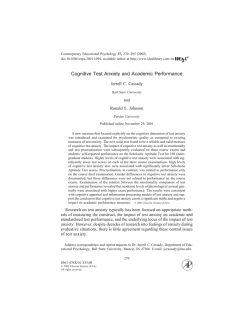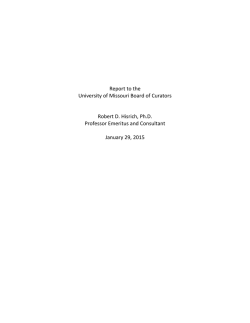
Anthropology and the Non-Natural Properties of Human Nature
A Commentary on Maurice Bloch’s book Anthropology and the Cognitive Challenge prepared for the journal Social Anthropology Anthropology and the Non-Natural Properties of Human Nature: Relax and Enjoy Them Richard A. Shweder (Department of Comparative Human Development, University of Chicago) I admire the scope of Maurice Bloch’s book and his various critiques of psycho-phobia in social and cultural anthropology. Maurice Bloch is one of the most prominent contemporary voices in anthropology cautioning the discipline against the temptation to exaggerate cultural differences; reminding his colleagues that normal adults in all cultures possess a kind of primary or basic knowledge of the world (including their capacity to understand each other’s minds) which unites them as human beings; and advising those of us who study the way culture and psyche make each up not to downplay or deny that undeniable fact. Happily he is not the only one to issue such warnings. The late Roger Kessing did as much in his eye-opening 1989 reproof titled “Exotic Readings of Cultural Texts.” He too was fond of admonishing anthropologists for choosing the most exotic possible cultural data and then interpreting that data in the most exotic possible ways. Those of us who are interested in genuine (rather than illusory) psychological diversity across cultural groups can readily accept Bloch’s message not to focus primarily on public ritual performances, speculative philosophical or religious texts or what he calls “second-order metarepresentations expressed in language.” A public lecture by a Scottish philosopher on the unreality of time, space, causation, morality and the self is probably not the best source of evidence for representing the customary behaviors and associated mentalities of normal Scottish adults. Nevertheless I hasten to offer the complementary caution against the temptation to underestimate the extent of cultural differences in human modes of thought. When it comes to claims about psychological unity and difference the exaggerations run in both directions. One has only to read the survey by Henrich, Heine and Norenzayan (2010), which documents the parochial or “weird” nature of experimental findings in mainstream Western psychology, and highlights the failure of many presumptive cognitive universals to be replicable across cultural groups. The take home message of their critical review is this: Be wary of strong claims about psychic uniformity and fundamental psychological processes derived primarily from experimental subjects who have been educated in rich industrial societies in Europe and North America, for those mental processes may be less fundamental than you think. Maurice Bloch, however, is really going after a much bigger fish than the existence of bias in research methodologies. He describes himself as a scientific naturalist who believes our mental life is somehow encompassed by our biological nature (he uses the terms “mind” and “brain” almost interchangeably throughout the text) and his book is largely aimed at philosophical or practical dualists in anthropology who draw a contrast between nature and culture (or what amounts to the same thing between mind and body). He is especially critical of the symbolic, 1 interpretive and linguistic turns in American cultural anthropology, precisely because he believes they place culture outside of nature and rely on methodologies he does not view as scientific. He believes the distinction between the natural and the cultural has done great harm to the discipline by blinding it to natural science discoveries in general psychology and the cognitive neurosciences. I suppose in one way or another I am guilty as charged. For I do draw a distinction between the study of physical things (neurons for examples) and the study of unphysical things (from mental states to abstract ideas such as the meaning of “good” as “such that it ought to be desired” to mathematical principles and moral truths) which in my vocabulary parallels the distinction between natural versus non-natural properties, both of which I view as real and relevant to the study of human nature and capable of disciplined investigation, although not necessarily using methods of the same sort. I have been quite critical of the metaphysical program of scientific naturalism in the cognitive neurosciences (Shweder 2012b) and even written a sympathetic essay about interpretive anthropology titled “Anthropology’s Disenchantment with the Cognitive Revolution” (Shweder 2012a). I won’t try to defend myself here, but rather identify a point or two for discussion. From the perspective of an interpretive anthropologist the term “cognitive” (as in the expression “the cognitive challenge”) refers to the challenge of figuring out how “mental representations” (thoughts, concepts and ideas that have semantic properties such as content, reference and truthvalue - call that “meaning” if you like) play their part in producing and explaining human behavior. If I understand Maurice Bloch correctly he employs the term “cognitive” in a far broader sense. From his perspective cognitive theories “are about learning and information storage” (p. 150) and do not necessarily have semantic properties. This may be one reason he seems comfortable (as I am not) talking about neurologists and psychologists as though they there were engaged in the same enterprise and has so little to say about the distinction between “mind” and “brain.” Nevertheless, the book’s survey of research in the cognitive sciences is rich, sophisticated and informative. What I missed was a more thorough analysis of the philosophical foundations and precise scope of the author’s epistemology and metaphysical program (his naturalism). These are not really spelled out in any detail. It would be helpful, for example, to learn more about how far Maurice Bloch really wants to go in the direction of a purely physicalist view of the natural world. Some of the most exotic “second-order meta-representations expressed in language” are written by cognitive neuroscientists who argue that it is mindless neuronal activity rather than mindful and meaning-full self-determination that explains what we do and that our conscious sense of purposeful agency and willful decision making is merely an illusion or epiphenomenon that plays no part whatsoever as a cause of our behavior. Maurice Bloch apparently does not want to embrace this reductive implication of a physicalist ontology (at least he says so) but why not? If however his definition of the natural world does include nonphysical things (like human goals, values and beliefs) what precisely makes that natural world 2 natural, and why should we not continue to distinguish between the human “mind” and its ”brain,” between reasons and causes, and between things that do have semantic properties and things that don’t, with all that might imply about the rather special (or at least distinctive) nature of human beings (metaphorically suspended as Pascal once wrote between the angels and the beasts). Despite all these rather weighty philosophical questions perhaps Maurice Bloch’s definition of the natural world amounts to this: the natural world is that part of reality that can be studied using the methods of empirical science. But why should anthropologists bind themselves in that way? Why not use methods appropriate to the object of study? Mathematicians study un-physical/non-natural properties and they have done pretty well using methods of their own. I confess that much of the now fashionable research in the cognitive neurosciences strikes me as “deep phrenology” and “dustbowl empiricism.” Nevertheless I recognize that we live in the era of the brain, which means it may seemed old-fashioned (or merely tilting at windmills) to conclude with the following quotation: "However philosophy may bridge the gap between physical and mental, it still exists for practical purposes, and our practice on each side of it must differ accordingly." One hundred years after Sigmund Freud wrote that sentence, the gap remains, and the mind/body problem has not been solved. Which may be reason enough to keep some form of dualism going. Heinrich, Joseph, Heine, Steven and Norenzayan, Ara (2010) “The Weirdest People in the World?” Behavioral and Brain Sciences. 33 (2/3):1-75. Kessing, Roger (1989). “Exotic Readings of Cultural Texts.” Current Anthropology. 30: 459469. Shweder, Richard A. (2012). "Anthropology's Disenchantment with the Cognitive Revolution." In TOPICS: Journal of the Cognitive Science Society. 4(3): 354-61. Shweder, Richard A. (2012). "The Metaphysical Realities of the Unphysical Sciences: Or Why Vertical Integration Seems Unrealistic to Ontological Pluralists." In Creating Consilience, Integrating the Sciences and the Humanities. Ed. Edward Slingerland and Mark Collard. Oxford University Press, pp 56-73. 3
© Copyright 2026
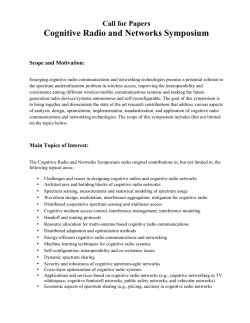
![Anthropology Seminar Series Spring 2015 [PDF 30.87KB]](http://s2.esdocs.com/store/data/000459047_1-7d84377bc849fc78a9376de82c187a04-250x500.png)

